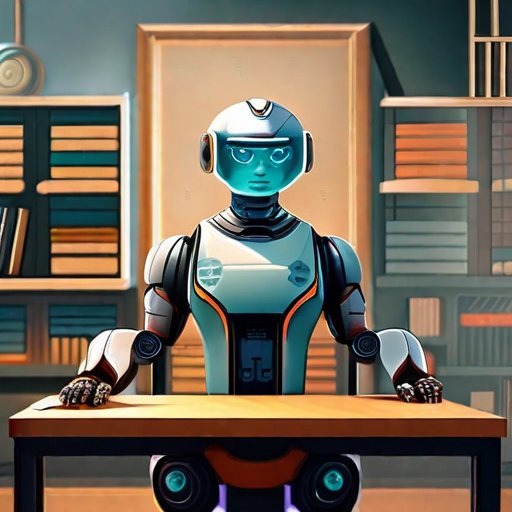AI and the Internet
Learn how Artificial Intelligence (AI) originated in the 1950s and transformed the way we experience the internet today. Explore the key milestones in the development of AI, its impact on our online lives, and its potential for the future. Dive into this fascinating world and uncover the secrets behind this modern marvel.

From Humble Beginnings to Modern Marvels Artificial Intelligence (AI) and the internet have been intertwined since the inception of the latter. Although AI has its roots in the 1950s, it was the advent of the internet that propelled it into the mainstream. Let's take a journey through time, exploring the historical evolution of AI, how it affects our online experiences, and what lies ahead.
The Beginnings of AI
AI can be traced back to the early 1950s with the work of Alan Turing, who conceptualized the Turing Test - a metric for measuring a machine's ability to exhibit intelligent behavior indistinguishable from that of a human. The 1960s saw the development of expert systems, which employed targeted knowledge to solve specific problems. By the 1980s, AI had advanced to the point of being used in commercial applications. However, it was during the 1990s when AI truly took off due to the increasing use of the internet.
AI Meets the Internet
The internet revolutionized the way we interact with information, making it more accessible and dynamic. With the rise of search engines like Google, AI was recognized as a valuable tool in understanding and categorizing that information. This started with simple algorithms like PageRank which rely on link analysis to determine the importance of web pages. Today, AI is used tirelessly behind the scenes running everything from recommendation systems to voice assistants like Siri or Alexa. It even helps us purchase products by providing personalized suggestions based on our previous searches and purchases.
|
|
AI's Challenges As AI grew up, it faced some significant hurdles. There were concerns about job losses, ethics, and the feasibility of creating truly intelligent machines. But the AI community persevered, driven by a collective belief in the potential of AI to transform the world. They kept pushing boundaries, improving algorithms, and creating more sophisticated systems. Keeping up with the ever-changing internet landscape requires constant evolution in AI. Natural Language Processing (NLP), for instance, has achieved phenomenal progress in recent years, allowing machines to comprehend human language. This allows for more natural interactions with users. Deep Learning, a type of AI that can learn from vast amounts of data, has also seen significant growth, enabling AI to better understand and respond to complex problems associated with large data sets. Additionally, machine learning has allowed AI to improve its performance through experience, making our online experiences smoother and more efficient. |
AI's present-day applications are just the tip of the iceberg. In the coming years, we can expect AI to play an even more prominent role in our lives. From virtual assistants helping us manage our daily tasks to AI-powered chatbots handling customer service, the possibilities are endless. Moreover, as more and more data is generated, AI will become more accurate and efficient, refining its abilities to understand and respond to human needs. Simultaneously, advancements in AI hardware like GPUs and TPUs are speeding up computations, enabling AI systems to process extremely large amounts of data quickly. It's an exciting time for AI and the internet, as they continue to evolve together to make our lives more convenient and connected.
What we have today and what we are headed towards:
Today, AI is no longer a dream. It's a reality that's integrated into almost every aspect of our lives. From self-driving cars to personalized online recommendations, AI influences our daily routines. Still, the challenges persist. As AI becomes more advanced, we must grapple with questions about its impact on society, privacy, and ethics. But there's no denying the immense potential of AI to improve our lives and the world around us. We're living in a golden age of AI, and the future promises even more amazing breakthroughs.
As we move further into this AI-driven future, there are several trends we're likely to see:
1. AI-Fueled Personalization:
Algorithms will become even more critical in offering personalized content, ads, and recommendations, catering to individual preferences and needs.
2. AI-enabled Smart Homes:
From smart locks to smart fridges, AI-powered devices will make our homes more efficient and comfortable.
3. AI-driven Healthcare:
AI systems could revolutionize healthcare, helping with diagnoses and treatment plans.
4. AI for Social Good:
AI will play a crucial role in addressing major global challenges, such as climate change and poverty.
5. AI-powered Online Education:
AI could play a pivotal role in providing tailored learning experiences, adapting to each student's individual needs.
|
|
From its humble beginnings to its current power and prominence, AI has had a profound impact on our lives, especially through the internet. As we look ahead, the symbiotic relationship between AI and the internet will continue to thrive, reshaping the way we consume and interact with information, progressing in ways we can barely imagine. |
What's Your Reaction?






















